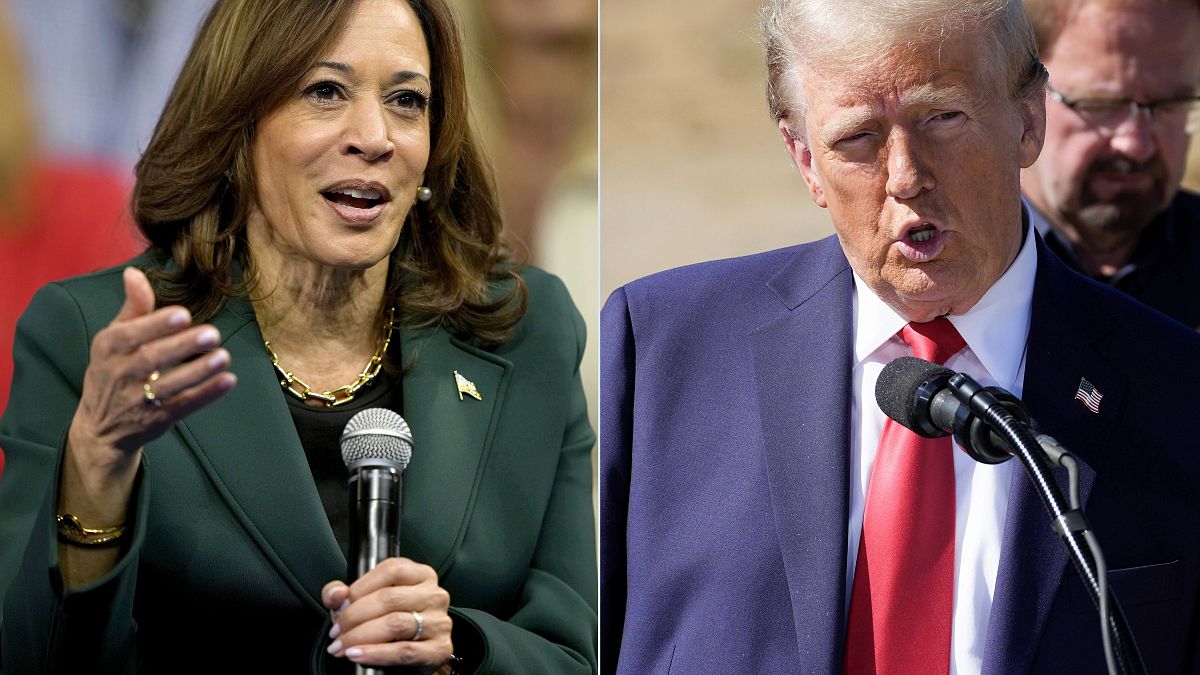Would Trump victory keep US ahead of Europe on AI?

How a Trump or Harris win in the 5 November presidential election impact the US stance on AI development and regulation.
With a week to go until Republican former President Donald Trump and his Democrat counterpart Kamala Harris face off in the US presidential election and with polls putting the result on a knife’s edge, the future direction of the US on AI remains up in the air, since both candidates contrast sharply in approaches to regulation and handling of the technology.
Unlike the EU where the AI Act was approved earlier this year in a bid to curb high-risk machine learning tools, the US lacks nation-wide AI rules. During the current mandate of outgoing Democrat President Joe Biden, however, the US government signed an executive order allowing it to make wider use of AI and to keep commercial use of AI on a tighter leash.
Trump has promised to repeal this if elected.
“We will repeal Joe Biden’s dangerous Executive Order that hinders AI innovation and imposes radical left-wing ideas on the development of this technology. In its place, Republicans support AI development rooted in free speech and human flourishing,” Trump stated in his manifesto.
Less regulation will most likely be welcomed by Big Tech companies. In July, Meta complained about the strict regulatory environment in Europe and decided not to roll-out its AI model here due to regulatory concerns.
“I hope the new Commission looks afresh at these issues, consistent with President Von Der Leyen’s aim of completing the EU’s digital Single Market, so Europeans can benefit from this new wave of technologies,” Meta’s President of Global Affairs, Nick Clegg, said in October.
Trump claims he spoke to Apple’s Tim Cook earlier this month to share concerns about the EU, including the €13bn fine it was ordered to pay in Ireland following unpaid taxes.
Historic investment to make US lead in AI
Harris takes a different approach, building on the existing commitments from the executive order. In her manifesto she has said this will “strengthen innovation and competitiveness, protect workers and consumers as technology advances, and develop a skilled federal AI workforce.”
She wants the US to continue to lead in the development and research of new technologies, and at commercialising it at scale.
Harris and her running mate Tim Walz are proposing “a historic investment to shore up our national and economic security by making sure the United States — not China— leads in AI by scaling up and making permanent the National Artificial Intelligence Research Resource, a shared research infrastructure to give start-ups and researchers access to the most advanced computing power, data, and analytical tools, to surge responsible discovery and innovation in AI.”
Daniel Schnurr, a Professor of Machine Learning and Uncertainty Quantification at the University of Regensburg, Germany, told Euronews that Harris is “more likely to continue on the current path”.
“I would expect a Harris administration to be more active in terms of AI regulation compared to Trump, although the approach will likely be much lighter than something like the EU AI regulation in any case,” he added. A Trump win, by contrast, would introduce much more uncertainty for AI providers.
A study from think tank Bruegel found that in the first half of 2024 alone, of more than $35 billion invested globally into artificial intelligence startups, the EU attracted a mere 6%.Despite European Commission initiatives designed to speed the uptake of AI and its development by making AI supercomputers available for start-ups, the US is continuing to invest more in AI.
Schnurr added that the outcome of the vote will probably not significantly change the US advantage in terms of commercial AI technology and leading digital services. “The competitive gap in terms of the largest AI service providers is currently just too big to change quickly in a short amount of time,” he said.
Use of AI in the campaign
AI technology has also been deployed in the US Presidential campaign, signalling problems with underregulated tools in the US and AI’s potential contribution to fake news.
Trump, who claims he will “restore free speech” when elected, himself posted AI generated images of US singer Taylor Swift appearing to endorse him, which he later acknowledged were fake. Swift eventually endorsed Harris in September.
Trump-supporting tech mogul and X-owner, Elon Musk shared a video of Harris on his platform, put together by an AI voice-cloning tool, without indicating originally that it was intended as a parody. “I, Kamala Harris, am your Democrat candidate for president because Joe Biden finally exposed his senility at the debate,” the fake video said.
The US Federal Communications Committee (FCC) has proposed that all radio and television broadcast stations that air political ads should check whether they contain AI-generated content and provide an on-air announcement if so, which would reflect EU rules on political advertising. However, these rules are not in place before the 5 November vote.
Related
Zelenskyy reiterates call for air truce after huge Russian attack…
We need Russia to stop attacks, Zelenskyy says, backing calls for truce in air, at seaUkrainian president Volodymyr Zelenskyy has responded to overnight attacks
Europe scrambles to rearm as Trump threatens security guarantees and…
CNN — European leaders have vowed to rearm the continent at historic emergency talks h
Russia launches ‘massive’ attack on Ukraine after Europe rushes to…
Ukraine's energy and gas infrastructure came "under massive missile and drone shelling" by Russia on Friday, a Ukrainian minister said."The energy and gas infra
American severance may be averted, but Europe’s leaders must fear…
With a mixture of regret, laced with incredulity, European leaders gathered in Brussels to marshal their forces for a power struggle not with Russia, but with t












